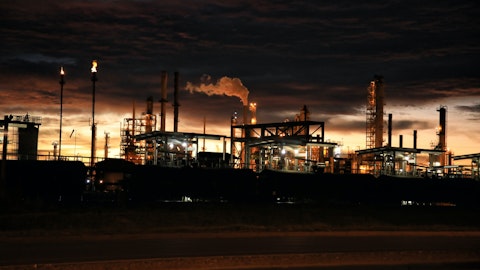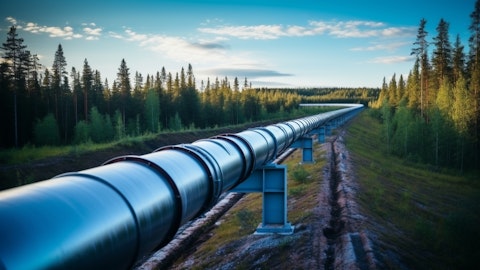Westy Ballard: Well, that’s a relationship that we are providing — engineering, management and pumping services to a third party who is then fueling a vessel that’s been going on for a couple of years. Also, did that for another container ship, a separate container ship company. Very similar construct, where we were providing engineering and management and service personnel to pump LNG into a container ship on behalf of a third party.
Bill Dezellem : And that third party is the shipping company itself? Or is there a contractor between the 2 of you?
Westy Ballard: Yes. So specific to Long Beach, there is a contractor between us that their responsibility was to source the gas and provide that to the container ship, and we were providing the services, project management logistics supply chain of picking up their gas and delivering it to their customer. That’s that construct. That’s — I wouldn’t look at that as being the business model across all the markets we’re expanding to. But in that specific instance, that was the construct.
Bill Dezellem : And actually could you tell about the expertise that you bring to the equation that in that case that the gas provider themselves was not able to do? Or why they were not able to do that?
Westy Ballard: Yes. I mean a lot of people really kind of stick to their knitting. And I think we’ve positioned ourselves as a turnkey provider of starting with the molecule and it could be our own molecule, or we can source that for somebody or somebody else can source it on their own, we’re fairly agnostic. But we have the technical expertise, the rolling stock in many instances. We have the engineering, the commercial capability. We’ve got really kind of the entire infrastructure to provide permitting, the licenses, really all some of that qualitative stuff as well and some of the administrative stuff. We’ve got a full capability of investment that we’ve made operationally and — with our people and systems to deliver a turnkey solution from production all the way to last mile delivery, whether it’s in our industrial business, aerospace business or marine business.
No one else really has that. No one else has that capability, nor they’ve invested in that capability, nor they’ve demonstrated the desire to invest in that capability.
Bill Dezellem : Great. And in the opening comments, you also referenced having both plants essentially sold out. And you mentioned the time frame, and I missed what that time frame was. Would you please repeat that?
Westy Ballard: Yes. So based upon LLMs we’re looking through, we think that it stands the reason that by midpoint this year and well into 2025, our plants will be effectively sold out, Bill.
Bill Dezellem : And today, the 95% capacity at George West, do you consider that sold out? Or do you still see more — you’re really wanting to get up to 100% or more?
Westy Ballard: I want to get up to 100% or more, and I think I’m optimistic that we’re going to get there.
Bill Dezellem : Okay. Great. And so when you take both accounts or both plants and put them together, what would be current utilization be running at, say, in the fourth quarter?
Westy Ballard: Yes. If you take George West at kind of the mid- to high 90s and, Andy, Port Allen was kind of in the…
Andy Puhala: Mid-80s.
Westy Ballard: Mid-80s, it’s probably the low — on a just kind of weighted average. It’s probably the low to low mid-90%.
Bill Dezellem : Great. That’s helpful. And Port Allen, does it have much volatility in its utilization? We just don’t talk about it much. Or is it similar to George West that it has its level and it’s kind of holding there now?
Westy Ballard: The latter. It’s got very low volatility, and we’ve got a very strong counterparty customer that absorbs the vast majority of that production.
Operator: [Operator Instructions]. We’ll take next question from [Spencer Layman].
Unidentified Analyst: Just a couple of quick questions. The current administration in Washington seems to be antagonist to fossil fuels and specifically LNG now with the foreign exports. How do you see that impacting you domestically and maybe in the future? Are you worried about that?
Westy Ballard: I’m not overly concerned about it because if you think about it, just in general, low natural gas prices really are our friend. And if you think about the competitive landscape, certainly, there may be other operating companies out there, but the real competition for me are oil prices for diesel or propane or other kind of maybe types of natural gas. And so we don’t think it has a dramatic impact, not the least of which we’ve already got our permanent licenses for export. So we’re already grandfathered in. It might actually work to our benefit to the extent that others are successful. But also that’s really a world-scale phenomenon. And we think world-scale, you’re thinking 1.5 million, 2 million of gallons of production a day.
And so Chenieres and Tellurians and all these new kind of greenfield projects that are coming on for export, that’s going to, I think, more dramatically impact them than really in the small-scale world where we participate, which is filling rocket ships for space exploration or marine bunkering for large ocean vessels and cruise ships.
Unidentified Analyst: Okay. That sounds good. And then the second question on hydrogen distribution. There’s been a lot of talk lately and it’s starting to heat up, and I guess they’re looking for some kind of guaranteed supply if a big gesture comes in? Are you still — are you guys still pretty excited about the future of hydrogen?
Westy Ballard: I think we’re excited about a variety of things. I don’t know, since I joined the company, and I know that there was some thoughts around hydrogen that predates me. I don’t know that I’m as bullish on it. I’m not overly bearish, but I think that there are other transitional fuels that are scalable, clean and readily available and secure and cost effective. The thing about hydrogen, if it’s not green, it’s not green. And so if it’s going to be blue or gray, then you’re better off utilizing a resource that is clean natural gas. And so I think the scalability and practicability around green hydrogen is pretty far in the future. So I’m not against hydrogen or methane or on any of it, and we’ll be thoughtful around not just LNG, but other fuels — as marriage fuels and our product solutions offerings, but I think hydrogen is 1 that’s a little bit harder for me to get my head around at this point in time, kind of given the visibility that I see.

